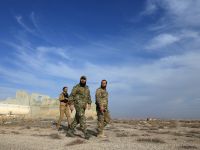When a lot is not enough
In early February, over 300 people died in the Mediterranean Sea’s freezing waters, trying to make their way to Italy from North Africa. Some of them came from Sub-Saharan Africa; many were Syrians chased away by the civil war and poor conditions for war refugees in neighboring states.
In the wake of the tragedy, the United Nations High Commissioner for Refugees sent a letter to Federica Mogherini, the EU’s High Representative for Foreign Affairs, with the aim of pushing for a new plan on the redistribution of asylum seekers and refugees from the EU’s southern countries to the rest of Europe.
Source: Now.
The sentencing of a Tunisian blogger has activists worried about how “free Tunisia is
Repression then chaos, unity then collapse. Amidst the disappointing fallout of the 2011 Arab Spring, there are few bright spots in the Middle East and North Africa with one notable exception: Tunisia. In the region, the small North African country is seemingly alone in moving toward a more progressive and open society. But, after being named the only “free” Arab state by Freedom House’s 2015 Freedom in the World Report, the country’s human rights record is drawing scrutiny.
Last winter, after returning from a trip abroad, Tunisian blogger Yassine Ayari was detained at the airport in Tunis. Ayari had been sentenced in absentia on November 18, 2014 to three years in prison. His crime? Allegedly using his Facebook page and blog to defame senior defense ministry officials as well as army officers by accusing them of financial abuse.
Source: Muftah
How the MENA region lags behind on business transparency – and why it must change
The interaction between government agencies and the business sector is an often-intricate ordeal. On the one hand, you have a regulator setting the rules of the playground and supervising all activities. On the other hand, there is a pivotal cog to growth and employment, constantly attempting to balance ethics and the pursuit of rents. The nature of this interaction, particularly in the Middle East, is crucial in developing the state of the economy. Specifically, the regulations set by the public sector will inherently dictate the fluidity with which businesses can set up shop as well as the ease of their operation.
Source: Your Middle East







